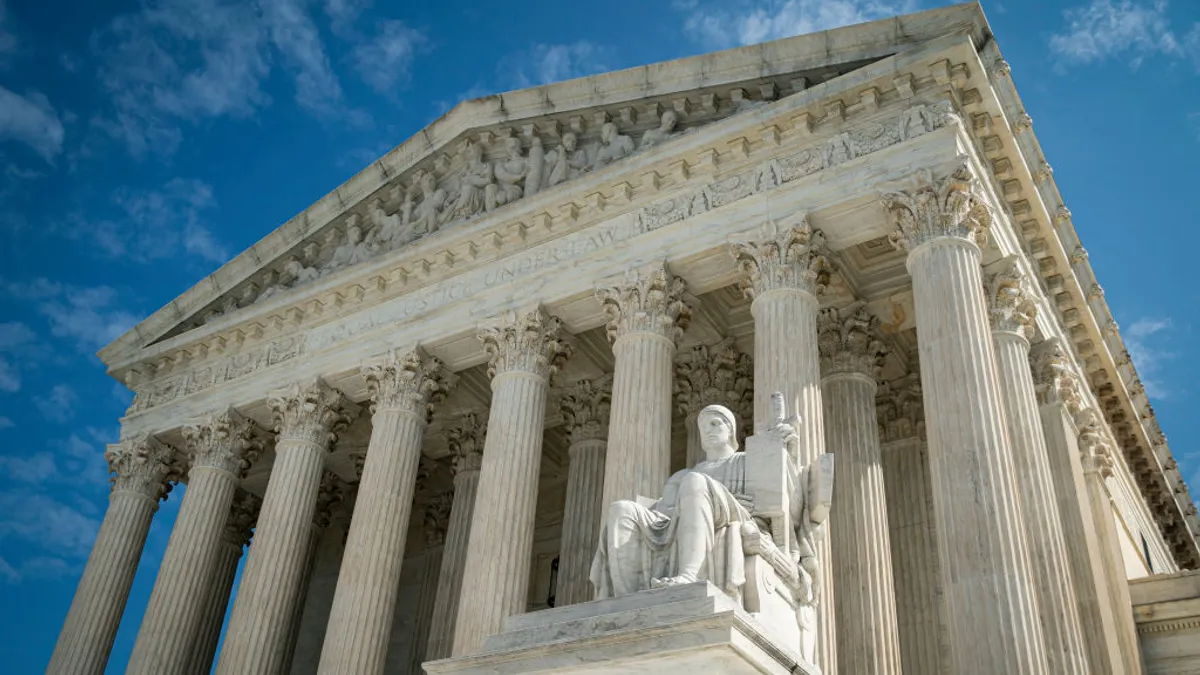Dive Brief:
- The U.S. Supreme Court issued a stay on the Occupational Safety and Health Administration's COVID-19 vaccination emergency temporary standard in a per curiam decision published Thursday.
- "OSHA has never before imposed such a mandate," the court said. "Nor has Congress. Indeed, although Congress has enacted significant legislation addressing the COVID–19 pandemic, it has declined to enact any measure similar to what OSHA has promulgated here." Associate Justices Neil Gorsuch, Samuel Alito and Clarence Thomas issued an opinion concurring in the decision. Associate Justices Stephen Breyer, Sonia Sotomayor and Elena Kagan dissented.
- However, the court issued a separate per curiam opinion dissolving injunctions placed on a vaccination mandate for healthcare workers issued by the Centers for Medicare and Medicaid Services.
Dive Insight:
As several of the justices hinted during oral arguments on Jan. 8, the issue of whether to stay OSHA's ETS came down to the agency's statutory authority granted to it under the Occupational Safety and Health Act. Ultimately, the majority determined the ETS' challengers were likely to succeed on the merits of their claim that Secretary of Labor Marty Walsh lacks the authority to issue such requirements.
"This is no 'everyday exercise of federal power,'" the Supreme Court wrote, citing its own precedent stating that it expects Congress to "speak clearly when authorizing an agency to exercise powers of vast economic and political significance." That refers to the court's major questions doctrine, which observers had speculated it might invoke.
In its decision upholding the CMS mandate, however, the court held that Secretary of Health and Human Services Xavier Becerra acted within the authority conferred upon him by Congress. "The challenges posed by a global pandemic do not allow a federal agency to exercise power that Congress has not conferred upon it. At the same time, such unprecedented circumstances provide no grounds for limiting the exercise of authorities the agency has long been recognized to have," read the decision.
In a statement Thursday, Walsh said he was "disappointed" with the court’s decision, calling it "a major setback to the health and safety of workers across the country." He noted that OSHA would continue to hold businesses accountable for protecting workers as part of its COVID-19 National Emphasis Program and under its General Duty Clause.
"We urge all employers to require workers to get vaccinated or tested weekly to most effectively fight this deadly virus in the workplace," Walsh said. "Employers are responsible for the safety of their workers on the job, and OSHA has comprehensive COVID-19 guidance to help them uphold their obligation."
Generally, management-side attorneys who spoke to HR Dive said they were not shocked by the outcome. "I can't say I was surprised by the decision," said Melissa Bailey, shareholder at Ogletree Deakins. "I think the writing was on the wall given some of the questions the justices asked."
But the OSHA ETS ruling is notable in that a more tailored standard from the agency could be viewed more favorably by the justices, according to Sean Marotta, partner at Hogan Lovells. It remains unclear how expansive such a standard would be, he added.
For the moment, employers should note that "it's back on them to decide whether they want to have a vaccine mandate," Marotta said. "They unfortunately can't rely on OSHA for uniformity."
Employers should still be mindful that they may be subject to certain executive orders or requirements instituted by state OSHA plans, said Catherine Barbieri, co-chair of Fox Rothschild's national labor and employment department. For example, Minnesota's state OSHA, MNOSHA, had adopted the federal ETS but announced Thursday that it would suspend enforcement pending future developments.
"While I am relieved that the Supreme Court upheld the Centers for Medicare and Medicaid (CMS) rule protecting health care workers and patients, today's decision is a significant setback in our efforts to protect workers from COVID-19 in the workplace," Rep. Bobby Scott, D-Va., chairman of the House Committee on Education and Labor, said in a statement. "The Supreme Court's decision to block OSHA's emergency workplace standard undermines a 50-year-old workplace safety law and threatens OSHA's authority to protect workers during a public health emergency."












